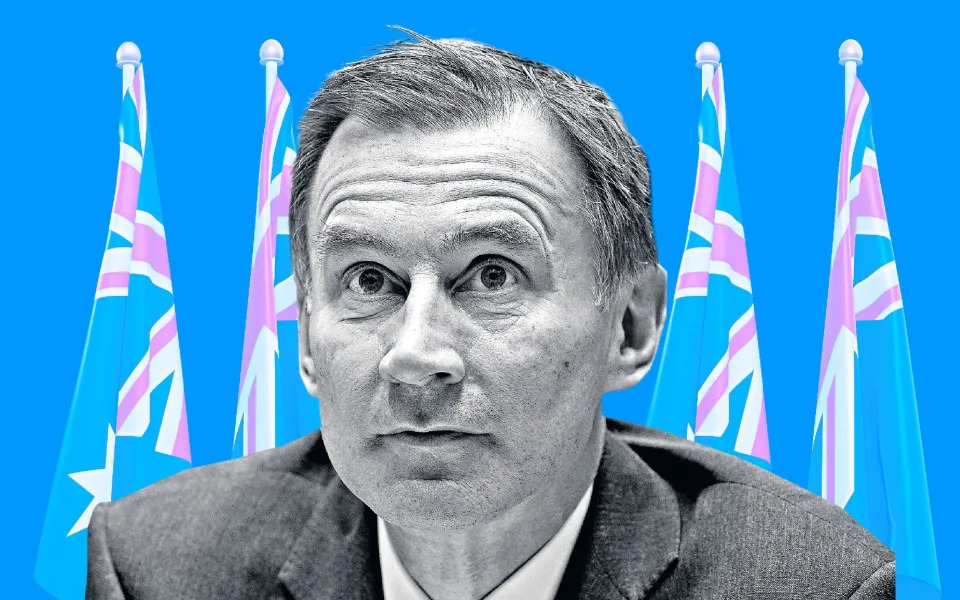THATCHER PRIVATIZED WATER
Thames Water debt crisis threatens taxpayer with multibillion-pound bill
ONTARIO PUBLIC SECTOR PENSION FUND; OMERS,
IS A MAJOR SHAREHOLDERBen MarlowFri, 16 February 2024  Thames WaterThe debt crisis at Thames Water risks a bill for taxpayers running into the billions of pounds, according to contingency plans being drawn up to avert disruption to supplies.It is feared that regulatory rulings will prompt the company’s shareholders to pull the plug in the coming months.Sources close to the situation said that by refusing to invest they would force Thames Water into special administration, where it would immediately require a hefty slug of public money to keep contractors on the job and supplies flowing.The concerns are being stoked by the belief that the industry regulator Ofwat is poised to block a request from Thames Water to hit one in four homes with a 40pc jump in bills.The company’s shareholders, which are led by the Canadian pensions giant Omers and the Universities Superannuation Scheme, have made further investment dependent on approval.Thames Water has asked its backers for a cash injection of £3.3bn. Ofwat could also hit the company with hundreds of millions of pounds of fines, however.Without the shareholder cash there are concerns that Thames Water would be unable to service its giant debt pile at a time when the beleaguered utility must find billions of pounds to repair its leaky network of pipes and sewers.The mounting crisis is already prompting moves in Whitehall. Water company insolvency laws are currently being amended to make it easier for the Government to step in, including on the grounds that it has fallen short of performance targets.If Thames Water is put into special administration, it is estimated that as much as £5bn of financial support would be needed from the outset “just to keep the lights on”, according to a Whitehall source. Without immediate Treasury guarantees, critical contractors could down tools, it is feared.Sources close to the discussions cautioned that they remain at the contingency planning stage and administration could be averted if Ofwat gives the green light to ramp up bills over the next five-year cycle, starting in 2025.A decision is expected by June. The special administration regime has been used before when the energy supplier Bulb went bust in 2021. It was eventually sold to Octopus Energy.Thames Water is struggling under the weight of borrowings of nearly £19bn. Last year its auditor warned it could run out of cash by April.Its troubles have spooked the debt markets, prompting a sell-off of its bonds that has left prices at all-time lows. The value of a bond linked to an entity in Thames Water’s sprawling corporate structure has crashed to less than 39p in the pound. Seven months ago the IOUs were changing hands for 87p.Thames Water previously announced that it had secured an initial £750m of new equity into the company by 2025 subject to conditions. However, in December, finance director Alastair Cochran was forced to admit that the funds were still to be confirmed.“Investors are looking for some comfort from Ofwat that it will support that business plan,” Cochran said at the time. “They will take a pragmatic view depending on the feedback they get.”Investors have also asked Ofwat to agree to less punitive fines for missing pollution and other performance targets.In October, it was named among the industry’s worst performers in the watchdog’s annual review for a third year. It came just weeks after Thames Water was hit with a £101m fine for “lagging” in its efforts to clean up pollution, plug leaks and improve customer service. The penalty was later reduced to £73.8m.Ofwat is also investigating whether Thames Water broke a new licensing agreement by paying a £37.5m dividend that ultimately ended up with the company’s parent.If it is found to have breached the rules it could face a fine equivalent to 10pc of turnover. The company reported revenue of nearly £2.3bn last year.A Thames Water spokesman said: “We take our licence obligations very seriously, including those relating to the declaration and payment of dividends. Our plans assume no external dividends to shareholders until at least 2030, to support our turnaround.”On Friday, Sir Adrian Montague quit as chair of Thames Water’s parent company Kemble. Regulators had reportedly raised concerns that the board of Kemble and Thames were not sufficiently independent from each other, particularly with Montague chairing both companies.Industry sources believe Thames Water could also be facing a steep penalty for storm overflow failures.A Government spokesman said: “We prepare for a range of scenarios across our regulated industries – including water – as any responsible government would.”Ofwat declined to comment.
Thames WaterThe debt crisis at Thames Water risks a bill for taxpayers running into the billions of pounds, according to contingency plans being drawn up to avert disruption to supplies.It is feared that regulatory rulings will prompt the company’s shareholders to pull the plug in the coming months.Sources close to the situation said that by refusing to invest they would force Thames Water into special administration, where it would immediately require a hefty slug of public money to keep contractors on the job and supplies flowing.The concerns are being stoked by the belief that the industry regulator Ofwat is poised to block a request from Thames Water to hit one in four homes with a 40pc jump in bills.The company’s shareholders, which are led by the Canadian pensions giant Omers and the Universities Superannuation Scheme, have made further investment dependent on approval.Thames Water has asked its backers for a cash injection of £3.3bn. Ofwat could also hit the company with hundreds of millions of pounds of fines, however.Without the shareholder cash there are concerns that Thames Water would be unable to service its giant debt pile at a time when the beleaguered utility must find billions of pounds to repair its leaky network of pipes and sewers.The mounting crisis is already prompting moves in Whitehall. Water company insolvency laws are currently being amended to make it easier for the Government to step in, including on the grounds that it has fallen short of performance targets.If Thames Water is put into special administration, it is estimated that as much as £5bn of financial support would be needed from the outset “just to keep the lights on”, according to a Whitehall source. Without immediate Treasury guarantees, critical contractors could down tools, it is feared.Sources close to the discussions cautioned that they remain at the contingency planning stage and administration could be averted if Ofwat gives the green light to ramp up bills over the next five-year cycle, starting in 2025.A decision is expected by June. The special administration regime has been used before when the energy supplier Bulb went bust in 2021. It was eventually sold to Octopus Energy.Thames Water is struggling under the weight of borrowings of nearly £19bn. Last year its auditor warned it could run out of cash by April.Its troubles have spooked the debt markets, prompting a sell-off of its bonds that has left prices at all-time lows. The value of a bond linked to an entity in Thames Water’s sprawling corporate structure has crashed to less than 39p in the pound. Seven months ago the IOUs were changing hands for 87p.Thames Water previously announced that it had secured an initial £750m of new equity into the company by 2025 subject to conditions. However, in December, finance director Alastair Cochran was forced to admit that the funds were still to be confirmed.“Investors are looking for some comfort from Ofwat that it will support that business plan,” Cochran said at the time. “They will take a pragmatic view depending on the feedback they get.”Investors have also asked Ofwat to agree to less punitive fines for missing pollution and other performance targets.In October, it was named among the industry’s worst performers in the watchdog’s annual review for a third year. It came just weeks after Thames Water was hit with a £101m fine for “lagging” in its efforts to clean up pollution, plug leaks and improve customer service. The penalty was later reduced to £73.8m.Ofwat is also investigating whether Thames Water broke a new licensing agreement by paying a £37.5m dividend that ultimately ended up with the company’s parent.If it is found to have breached the rules it could face a fine equivalent to 10pc of turnover. The company reported revenue of nearly £2.3bn last year.A Thames Water spokesman said: “We take our licence obligations very seriously, including those relating to the declaration and payment of dividends. Our plans assume no external dividends to shareholders until at least 2030, to support our turnaround.”On Friday, Sir Adrian Montague quit as chair of Thames Water’s parent company Kemble. Regulators had reportedly raised concerns that the board of Kemble and Thames were not sufficiently independent from each other, particularly with Montague chairing both companies.Industry sources believe Thames Water could also be facing a steep penalty for storm overflow failures.A Government spokesman said: “We prepare for a range of scenarios across our regulated industries – including water – as any responsible government would.”Ofwat declined to comment.










